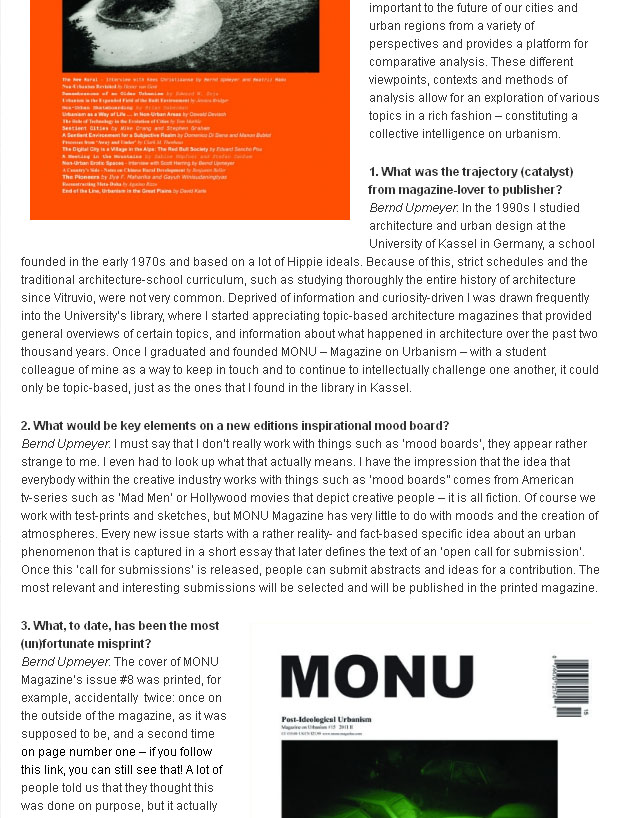07-01-13 // INTERVIEW WITH BERND UPMEYER BY INDIGITS MAGAZINE

Bernd Upmeyer has been interviewed by the online magazine Indigits about his role as an independent magazine publisher:
Indigits: What was the trajectory (catalyst) from magazine-lover to publisher?
Bernd Upmeyer: In the 1990s I studied architecture and urban design at the University of Kassel in Germany, a school founded in the early 1970s and based on a lot of Hippie ideals. Because of this, strict schedules and the traditional architecture-school curriculum, such as studying thoroughly the entire history of architecture since Vitruvio, were not very common. Deprived of information and curiosity-driven I was drawn frequently into the University’s library, where I started appreciating topic-based architecture magazines that provided general overviews of certain topics, and information about what happened in architecture over the past two thousand years. Once I graduated and founded MONU – Magazine on Urbanism – with a student colleague of mine as a way to keep in touch and to continue to intellectually challenge one another, it could only be topic-based, just as the ones that I found in the library in Kassel.
Indigits: What would be key elements on a new editions inspirational mood board?
Bernd Upmeyer: I must say that I don’t really work with things such as ‘mood boards’, they appear rather strange to me. I even had to look up what that actually means. I have the impression that the idea that everybody within the creative industry works with things such as ‘mood boards” comes from American tv-series such as ‘Mad Men’ or Hollywood movies that depict creative people – it is all fiction. Of course we work with test-prints and sketches, but MONU Magazine has very little to do with moods and the creation of atmospheres. Every new issue starts with a rather reality- and fact-based specific idea about an urban phenomenon that is captured in a short essay that later defines the text of an ‘open call for submission’. Once this ‘call for submissions’ is released, people can submit abstracts and ideas for a contribution. The most relevant and interesting submissions will be selected and will be published in the printed magazine.
Indigits: What, to date, has been the most (un)fortunate misprint?
Bernd Upmeyer: The cover of MONU Magazine’s issue #8 was printed, for example, accidentally twice: once on the outside of the magazine, as it was supposed to be, and a second time on page number one – if you follow this link, you can still see that! A lot of people told us that they thought this was done on purpose, but it actually wasn’t. There is, in fact, not a single issue that has no small misprint somewhere. That is also why the moment the copies of the new issue arrive is always a very scary moment. There is always a little shock involved. You get the boxes, you open them, and then you realize, for example, that texts have been moved, images appear in wrong colours, the cover is too glossy, etc., etc. There is no such thing as a magazine without misprints. Luckily most of them are only recognisable for the people who worked on the magazine.
Indigits: Who or what would be your dream feature?
Bernd Upmeyer: As a trained architect myself, I get asked often, especially by non-architects, what my dream house-design would be. I must say that such a question comes typically from a non-architect, thinking that architects walk around dreaming about possible designs. But that is a cliché. To the contrary, I experience creative processes as hard work and as rather voluntary – and not as involuntary things such as dreams that simply occur. And the architects that I know, for example from Rotterdam, think and work in a similar way. I believe that those processes only lead to interesting results, if you, in fact, stop dreaming and start understanding and analysing meanings, relevance and relations between things. Being too fixated on particular results and dreams will make you only blind to and ignorant of the great chances and opportunities that appear in front of you. That is why I also don’t have a particular dream feature when it comes to MONU. All the features of the magazine are the result of long hours of concentrated work and this concentration is always focused on the tasks and problems of that very moment.
[…]
Continue reading the entire interview at Indigits.